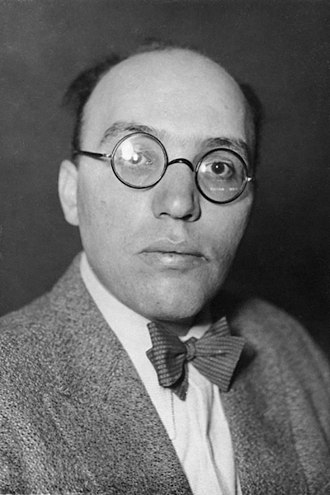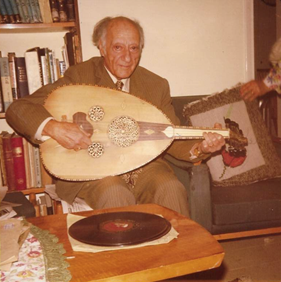Kurt Julian Weill was born in Dessau, Germany in 1900. His father was a cantor and his mother had rabbinical roots. After establishing himself with several satirical and surrealistic operas, he became famous with playwright Bertold Brecht through such works as TheThree-Penny Opera. With Hitler's rise to power, his works were classified as degenerate. In 1933, Weill left Germany for France, however after a short stay there he emigrated to the USA. In the USA he was influenced by popular music and jazz, he met several of the outstanding figures of the Broadway stage and began to write musicals that enjoyed tremendous popularity. Weill held the ideal of writing music that served a socially useful purpose, Gebrauchsmusik. All the while, he never stopped writing operas and classical music. He wrote several works for the concert hall and a number of works on Jewish themes. In 1946, four years before his death, he composed the Jewish prayer 'Kiddush,' dedicated to his father.
See Kurt Weil's website, Kurt Weill Foundation For Music. It includes biographical and historical information on Kurt Weil and a detailed list of his works. In addition, the site contains a very extensive bibliography of Kurt Weill.
Primary Sources:
Some photoes of Weill and a detailed catalog of his works can be found on the website of the Kurt Weill Centre. The Kurt Weill Centre is a cultural site in Dessau, in Saxony-Anhalt, Germany. It is a museum and information centre about the life and work of Kurt Weill.
For Kurt Weil's list of publications in the National Library of Israel see here. It includes archival materials such as scores, manuscripts, books, ethnographic recordings and commercial recordings.
The Universal Edition-Kurt Weill Archives contains manuscripts and microfilms of Weil's works. The archive is deposit at the Ruth T. Watanabe Special Collections Department, Sibley Music Library, Eastman School of Music, University of Rochester.
List of Hebrew songs he composed, in Zemereshet (זמרשת) and Bait Lazemer Haivri (בית לזמר העברי).
Other Resources:
The documentary film, Kurt Weill, by Sven Dufer. He reconstructs the biography of Weill, successfully utilizing archival footage, interviews with individuals who knew him and artists who preformed his compositions.
Drew David. ''Der Weg der Verheissung' and the prophecies of Jeremiah (I)'. Tempo 306 (1998): 12-20. (The full article can accessed online)
Additional biographies:
Gregg Wager, Kurt Weill. Published in The OREL Foundation.
'Kurt Weill' in Wikipedia.






